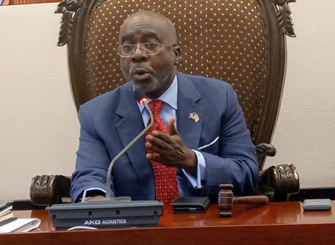The resignation of Speaker J. Fonati Koffa from the Liberian House of Representatives marks the culmination of a protracted political struggle, one characterized by shifting allegiances, constitutional disputes, and escalating tensions within the government. Koffa, whose speakership had been affirmed just months prior by the Supreme Court of Liberia, cited the evolving political landscape and alleged violations of the constitution as the primary reasons behind his decision. He pointed to the inherent instability created by constantly changing political “rules,” making governance unpredictable and undermining the established legal processes. His resignation underscores the fragility of democratic institutions in Liberia, particularly the vulnerability of the legislature to executive influence and the precarious balance of power between the branches of government.
Central to the controversy was the Supreme Court’s December 2024 ruling, which unequivocally upheld Koffa’s position as Speaker. However, subsequent actions by President Joseph Boakai, specifically his focus on quorum requirements, effectively shifted the basis of legislative authority, thereby challenging the court’s decision. This created a situation where the Speaker’s legitimacy, though legally affirmed, was politically undermined. The President’s intervention, according to Koffa, altered the dynamics within the legislature, eroding his support base and creating an untenable situation. The resulting uncertainty and political maneuvering led to heightened tensions, increased security presence at the Capitol, and the risk of potential violence, ultimately contributing to Koffa’s decision to resign.
Koffa’s resignation was further influenced by the plight of unpaid legislative staff and the erosion of support from within his own caucus. He argued that the President’s actions effectively stripped him of the power associated with the Speakership, rendering the title meaningless while others exercised its authority. This untenable position, combined with the financial strain on legislative employees who went unpaid due to the ongoing dispute, strengthened his resolve to step down. He emphasized the impracticality of clinging to a title devoid of actual power, highlighting the dysfunction within the legislature and the broader political system. The confluence of these factors painted a clear picture of an institution grappling with internal conflicts and external pressures, ultimately leading to the Speaker’s resignation.
Addressing allegations surrounding his resignation, Koffa vehemently denied accusations of accepting financial inducements in exchange for stepping down. He maintained that if he were inclined to “sell out,” the opportune moment would have been before the Supreme Court hearing. He clarified that the only financial transactions involved were the legitimate salaries and benefits owed to legislative staff, emphasizing the importance of ensuring their financial well-being. He further reiterated his call for an international investigation into the previous year’s fire incident at the Capitol and related allegations involving his staff, underscoring his commitment to transparency and accountability, and separating criminal investigations from political negotiations.
Koffa’s announcement of his upcoming book, titled “From 1-73: The Conspiracy at the Capitol,” suggests a deeper, more intricate narrative underlying the events leading to his resignation. This forthcoming publication promises to provide a detailed account of the political machinations and alleged conspiracies that shaped the conflict, offering a potentially insightful perspective on the power struggles within the Liberian government. His departure leaves behind a complex legacy, marked by both legal victories and political defeats, underscoring the challenges faced by democratic institutions in navigating complex political landscapes.
The trajectory of events leading to Koffa’s resignation traces back to 2024, shortly after the inauguration of the Boakai administration. A faction within the legislature, identifying themselves as the Majority Bloc and backed by the Executive branch, initiated a vote of no confidence against Koffa, citing allegations of corruption and conflict of interest. This bloc subsequently declared his removal and installed Richard Nagbe Koon as Speaker. Koffa’s appeal to the Supreme Court resulted in a ruling that invalidated the Majority Bloc’s actions, deeming them beyond their authority and therefore illegal. However, despite this legal victory, the political maneuvering continued, ultimately culminating in his resignation. This chain of events highlights the ongoing tension between legal processes and political realities within Liberia’s governance structure.


